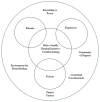Cultural Interpretations of Patients and Employees in an Organization Certified Through the Baby-Friendly Hospital Initiative: A Focused Ethnographic Study
- PMID: 40432287
- PMCID: PMC12238666
- DOI: 10.1177/08903344251337375
Cultural Interpretations of Patients and Employees in an Organization Certified Through the Baby-Friendly Hospital Initiative: A Focused Ethnographic Study
Abstract
Background: When organizations are certified through the Baby-Friendly Hospital Initiative, health care providers implement various policies that are intended to support long-term and exclusive breastfeeding. Despite the availability of evidence to support these policies, research findings are inconsistent in whether these goals are met. Exploring cultural interpretations through the lens of individuals within these organizations may reveal new evidence of breastfeeding experiences and needed support.
Research aim: To explore organizational cultural aspects of a Baby-Friendly certified organization from the perspective of patients and employees.
Method: Researchers implemented a focused ethnography design in one certified organization in Ontario, Canada. One-to-one, semi-structured interviews were performed with two participant groups, including 10 patients and eight employees within intrapartum and postpartum care areas between 2023-2024. An inductive data analysis approach followed Roper and Shapira's framework, including (1) coding for descriptive labels, (2) sorting for patterns, (3) identification of outliers, (4) generalizing with constructs and theories, and (5) memoing.
Results: Five core themes emerged from the data, including (1) knowledge is power, (2) community of support, (3) contextual considerations, (4) environment for breastfeeding, and (5) patient factors. Through narrative descriptions, these interrelated themes exhibit how patients and employees have experienced or provided care that is consistent with breastfeeding-supportive policies as well as additional gaps that may not be addressed through policy research.
Conclusion: The results provide implications for breastfeeding support within an organization certified through the Baby-Friendly Hospital Initiative. Understanding cultural interpretations of breastfeeding can provide information for future education and interprofessional development.
Keywords: Baby-Friendly Hospital Initiative; COVID-19; breastfeeding; breastfeeding experience; breastfeeding knowledge; breastfeeding practices; breastfeeding support; cultural norms; ethnography; health services research; postpartum care.
Conflict of interest statement
Disclosures and Conflicts of InterestThe authors declared the following potential conflicts of interest with respect to the research, authorship, and/or publication of this article: KTJ was KD’s academic supervisor at Western University. RB and PT were on KD’s supervisory committee for her PhD research. The authors disclosed no other potential conflicts of interest with respect to the research, authorship, and/or publication of this article.
Figures
Similar articles
-
Health professionals' experience of teamwork education in acute hospital settings: a systematic review of qualitative literature.JBI Database System Rev Implement Rep. 2016 Apr;14(4):96-137. doi: 10.11124/JBISRIR-2016-1843. JBI Database System Rev Implement Rep. 2016. PMID: 27532314
-
Sexual Harassment and Prevention Training.2024 Mar 29. In: StatPearls [Internet]. Treasure Island (FL): StatPearls Publishing; 2025 Jan–. 2024 Mar 29. In: StatPearls [Internet]. Treasure Island (FL): StatPearls Publishing; 2025 Jan–. PMID: 36508513 Free Books & Documents.
-
How to Implement Digital Clinical Consultations in UK Maternity Care: the ARM@DA Realist Review.Health Soc Care Deliv Res. 2025 May;13(22):1-77. doi: 10.3310/WQFV7425. Health Soc Care Deliv Res. 2025. PMID: 40417997 Review.
-
The experience of adults who choose watchful waiting or active surveillance as an approach to medical treatment: a qualitative systematic review.JBI Database System Rev Implement Rep. 2016 Feb;14(2):174-255. doi: 10.11124/jbisrir-2016-2270. JBI Database System Rev Implement Rep. 2016. PMID: 27536798
-
Can We Enhance Shared Decision-making for Periacetabular Osteotomy Surgery? A Qualitative Study of Patient Experiences.Clin Orthop Relat Res. 2025 Jan 1;483(1):120-136. doi: 10.1097/CORR.0000000000003198. Epub 2024 Jul 23. Clin Orthop Relat Res. 2025. PMID: 39051876
References
-
- Baby-Friendly Initiative Ontario. (2019). Baby-Friendly Initiative report for Ontario. https://www.bfiontario.ca/wp-content/uploads/2020/10/BFION-BFI-Report-20...
-
- Bell K. (2016). Exploring factors that influence adoption and implementation of the baby-friendly hospital initiative in Washington State. University of Washington. https://digital.lib.washington.edu/researchworks/items/1c9e29e1-d7e5-47b...
MeSH terms
LinkOut - more resources
Full Text Sources
Medical
Miscellaneous


